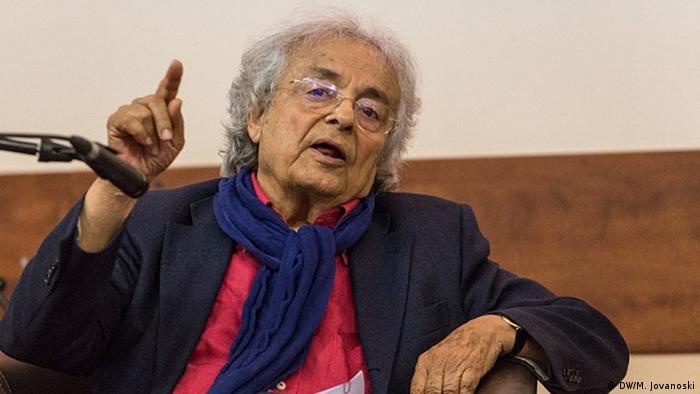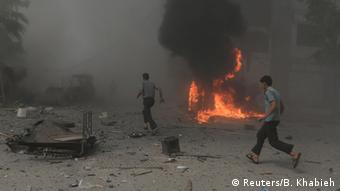German Peace Prize for Syrian poet Adonis?
 Deutsche Welle (DW), Germany’s international broadcaster, just published an article on its website which I am reproducing below. Ever since the announcement that Adonis was to receive the Erich Maria Remarque Peace Prize of the city of Osnabrück, unease has been expressed vocally by some who feel that Adonis has not been loud enough in his criticism of the Assad regime. Details of this criticism can be read in the article below.
Deutsche Welle (DW), Germany’s international broadcaster, just published an article on its website which I am reproducing below. Ever since the announcement that Adonis was to receive the Erich Maria Remarque Peace Prize of the city of Osnabrück, unease has been expressed vocally by some who feel that Adonis has not been loud enough in his criticism of the Assad regime. Details of this criticism can be read in the article below.
I have heard such criticisms before, here in the US, & in France as well. Some may be justified — or can be explained by the elder poet’s weariness. Still, he has been very clear as to his thinking on these matters. At our last meeting — a year ago — I asked Adonis about Assad’s regime — and the wider situation of the Arab world. His immediate and spontaneous reaction was to express a sense of deep pessimism, something close to despair. He is obviously not a fan of Assad’s, but is afraid that Assad, at this point, will only be toppled/replaced by a religious-based power structure (By the way, he has been saying this for many years, i.e. way before the rise of ISIS — note today’s news: one of Assad’s last major military bases fell to ISIS). He is deeply convinced that it doesn’t matter who, what kind of ruler, is running any given Arab country as long as religion remains central to the culture as such. Change, he said, possible democratic change on the political level too, can only come once the people realize that religion is what is holding them down, culturally and politically, and are willing to free themselves from this imposition. The culture has to change first in such a way — he put it elsewhere — that it will allow for questions to arise, which is not possible at this point. The Islamic culture that holds sway claims that all the answers to all possible questions were given when the religion was founded. There is thus no need to think, because any new thought is heresy.
Often (as in the article below too) Adonis’ stance brings with it the accusation that he is beloved by the liberal European intelligentsia because they see him as one of their own “rational” intellectuals — an accusation that, I believe, is a twisted reading of post-colonial thinking. A close look at American culture and politics — for example — will show that the einheimisch, local bigoted, fasciscoid, racist and ignorance-adoring political stances are all building on the wobbly fundamentalist rock of Christian dogma. Koran, Bible, même combat! (I always taught my students that, besides Iran, there were at least two further major lethal theocratic regimes in the world: the USA and Saudi Arabia.)
There is short poem of his, written for an exhibition of political art & poetry in Beirut last year, which I translated for tht occasion. Here it is:
The air, misshapen.
The country’s entrails, shredded by its children’s fingernails,
the crossroads robed in dust lit up by their wrinkles,
arrayed in clothes woven from their steps.
Who will tell the crossroads: no,
do not share your secrets with us.
We no longer expect the magic of dispersing us in them,
nor the bliss of reunion.
And here the German Welle article:
German peace prize for Syrian poet Adonis sparks outrage
Syrian poet Adonis has not vocally criticized the Assad regime. Now the decision to award him a German peace prize named after the pacifist writer Erich Maria Remarque is under fire.
Literarily, Ali Ahmad Said, who uses the pen name Adonis, never budged. For decades, he has shaped the avant-garde poetry scene not only in Syria, but in the entire Arab world.
In his own way, he put words to the deep political and cultural unrest that has shaken the region for the past 200 years, since European colonialism. “A time between ashes and roses is coming / When everything shall be extinguished / When everything shall begin,” he wrote in 1972, juxtaposing hope and upheaval.
With his poems, Adonis embodied the modern Arab intellectual that was so beloved in the West. From the European point of view, he represented the unspoken hope that the region would one day drop its religious rules and open up to what the West defines as its core value: reason.
Adonis represented West’s ideal intellectual
It was assumed for a long time that Adonis embodied modernity not only from a literary perspective, but also politically. For that reason, he has already received numerous awards in Europe. In 2001 he was awarded Germany’s Goethe Medal for intercultural understanding and in 2013 the Petrarca Prize for contemporary poetry.
In 2011, the city of Frankfurt presented him with its Goethe Prize. But even then, the accolade gave rise to unease. Critics objected to honoring a poet whose time seemed to have passed – at least politically speaking – and who wasn’t keeping up with events in his home country, Syria.
They questioned whether Adonis really understood his fellow Syrians’ protests against Bashar al-Assad’s regime.
Adonis said in an interview that Assad was capable of reforming Syria – even though he had already had thousands of people killed. The least Assad could do was to resign, added the poet.
His statements led to confusion. Had Adonis lost touch?
Adonis showed no sympathy for Syrian revolution
In the following years, the poet wasn’t able to counteract these suspicions. On the contrary: He made public statements that irrevocably discredited him for his fellow Syrians. He couldn’t support a revolution that began in the mosques, he said shortly after the beginning of the Syrian revolution, referring to the fact that Syrian dissidents were meeting in places of worships due to a lack of other suitable locations.
Recently, Adonis told the Lebanese daily “Al Safir” that he didn’t understand why Syrians were still labeled a “people of revolution” since a third of the population had already left the country.
Now Adonis has been chosen to receive the Erich Maria Remarque Prize from the German city of Osnabrück – the hometown of pacifist writer for which the award is named. It’s no big surprise that the decision has stirred up controversy not only among Arab intellectuals.
DW editor Ahmad Hissou, a native of Syria, called the announcement of the award a “black day.” After nearly five years of war, Adonis still has not shown solidarity with his compatriots, commented Hissou.
The DW editor added that he was astonished that the poet, who has lived in Paris for many years, derided the Syrians who are fleeing from Assad’s bombs and the weapons of the “Islamic State” in his interview with “Al Safir.” “At a time when Germany is taking in hundreds of thousands of Syrian refugees, Osnabrück is distinguishing a poet who has hardly ever criticized Assad,” summed up Hissou.
Why Adonis was chosen for the peace prize
This year’s winner of the Peace Prize of the German Book Trade, Navid Kermani, expressed his objection with deeds as well as words: He has refused the invitation to hold a laudation speech in Adonis’ honor on November 20 in Osnabrück.
Kermani told the German daily “Kölner Stadtanzeiger” that he respects Adonis’ work, but criticizes that the poet has not distanced himself from the brutal methods the regime in Damascus has taken against its own people.
The city of Osnabrück has said that the jury was well aware that the prize would stir up controversy. “The award for Adonis is intended to spark a discussion about the problems in Syria and about possible solutions, as well as about the responsibility other states bear and the influence they can have,” said the city in a statement.
Jury member and Osnabrück’s mayor, Wolfgang Griesert, pointed out that Adonis’ stance on other social issues – in particular, his “advocacy for a separation of religion and state and for equal rights for women in the Arab world” – were pivotal to the jury’s decision.
The poet addresses fundamental questions beyond the current conflict, said Griesert, explaining that his work fulfills the ideals of the Remarque peace prize.
More than 11 million Syrians, according to the UNHCR, are currently displaced. Some 250,000 people have fallen victim to the war, according to the officially recognized Syrian Observatory for Human Rights.
Most of the victims have been killed, not by the “IS,” but by Assad’s regime. “Adonis should have commented on that,” said DW editor Ahmad Hissou. “That would have been worthy of a peace prize.”
DW RECOMMENDS
Syrian refugee and philosopher receives Germany’s Goethe Medal
A Syrian refugee is among the three winners of Germany’s Goethe Medal for intercultural understanding: philosopher Sadik Al-Azm. Museum director Neil MacGregor and theater director Eva Sopher were also honored. (28.08.2015)
Navid Kermani: A political thinker
The Islam expert writes controversial books, provokes political debate and takes a firm stand on religious issues. As one of “society’s most important voices,” the German Book Trade awarded him its 2015 Peace Prize. (19.06.2015)
Syrian poet Adonis garners Germany’s Goethe Prize
Syrian poet Adonis is the recipient of this year’s Goethe Prize for “transposing Europe’s modern achievements into the Arab world,” the jury said. (28.08.2011)


 Poasis II: Selected Poems 2000-2024
Poasis II: Selected Poems 2000-2024 “Todesguge/Deathfugue”
“Todesguge/Deathfugue” “Interglacial Narrows (Poems 1915-2021)”
“Interglacial Narrows (Poems 1915-2021)” “Always the Many, Never the One: Conversations In-between, with Florent Toniello”
“Always the Many, Never the One: Conversations In-between, with Florent Toniello” “Conversations in the Pyrenees”
“Conversations in the Pyrenees” “A Voice Full of Cities: The Collected Essays of Robert Kelly.” Edited by Pierre Joris & Peter Cockelbergh
“A Voice Full of Cities: The Collected Essays of Robert Kelly.” Edited by Pierre Joris & Peter Cockelbergh “An American Suite” (Poems) —Inpatient Press
“An American Suite” (Poems) —Inpatient Press “Arabia (not so) Deserta” : Essays on Maghrebi & Mashreqi Writing & Culture
“Arabia (not so) Deserta” : Essays on Maghrebi & Mashreqi Writing & Culture “Barzakh” (Poems 2000-2012)
“Barzakh” (Poems 2000-2012) “Fox-trails, -tales & -trots”
“Fox-trails, -tales & -trots” “The Agony of I.B.” — A play. Editions PHI & TNL 2016
“The Agony of I.B.” — A play. Editions PHI & TNL 2016 “The Book of U / Le livre des cormorans”
“The Book of U / Le livre des cormorans” “Memory Rose Into Threshold Speech: The Collected Earlier Poetry of Paul Celan”
“Memory Rose Into Threshold Speech: The Collected Earlier Poetry of Paul Celan” “Paul Celan, Microliths They Are, Little Stones”
“Paul Celan, Microliths They Are, Little Stones” “Paul Celan: Breathturn into Timestead-The Collected Later Poetry.” Translated & with commentary by Pierre Joris. Farrar, Straus & Giroux
“Paul Celan: Breathturn into Timestead-The Collected Later Poetry.” Translated & with commentary by Pierre Joris. Farrar, Straus & Giroux